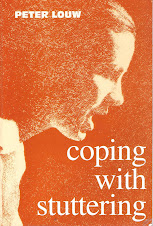 |
| Emily Blunt on the cover of Esquire |
When reading the life stories of famous stutterers who achieved success and significantly improved their speech it seems to me that they have somehow managed to get into this virtuous circle, perhaps without actually being aware of it. Some movie actors who used to stutter badly, such as Emily Blunt, may be examples of this phenomenon.
The saying goes that nothing succeeds like success, and this is true also of stuttering. I think that some talented people achieve initial career success because of their talent even when they have a stutter. This initial success increases their confidence, thereby lessening speech-related stress and tension levels and improving their fluency. The improved fluency in turn further reduces their stress and boosts confidence, and so a virtuous circle is created, paving the way to a successful career.
In interviews, Emily Blunt mentioned that her road to better fluency began when still in school, when a teacher suggested that she should act in a play, using a fake accent. Emily discovered that she was fluent when speaking in a fake accent, and apparently this newfound fluency was such a boost for her that she went on to become a famous actress. Speaking in a different accent serves as a distraction device for stutterers - it distracts your mind away from stuttering, and though the effect is usually temporary for most stutterers, it may just have given Emily the confidence she needed to send her on her way to success.
In technical terms: the confidence boost significantly reduced her "base-level tension" to far below her stuttering "threshold", resulting in greatly increased fluency margins. A significant reduction in base-level tension is usually the underlying cause of dramatic fluency improvements (and even the occasional real cure, though this doesn't happen often). For a description of terms such as "base-level tension" and "threshold", please see my book's chapter 'A possible cause of stuttering' which you can read HERE - use the search facility provided there to search for the terms inside the chapter.
I believe that confidence, and SPEAKING CONFIDENCE in particular, are major factors in stuttering, as they reduce speech-related stress and tension. I also believe that people who stutter can learn much from studying success stories such as Emily's. We who stutter should all try to get out of the vicious circle of stuttering, and instead become part of a virtuous circle. Even a single fluent conversation, perhaps brought about by using a fluency technique correctly, can be that major boost which may lead you on the way to better speech and success. I'm not saying that the virtuous circle will lead to complete fluency - chronic stuttering is seldom cured 100%, and even Emily Blunt still stutters occasionally - but the improvement in fluency could make a world of difference.






No comments:
Post a Comment